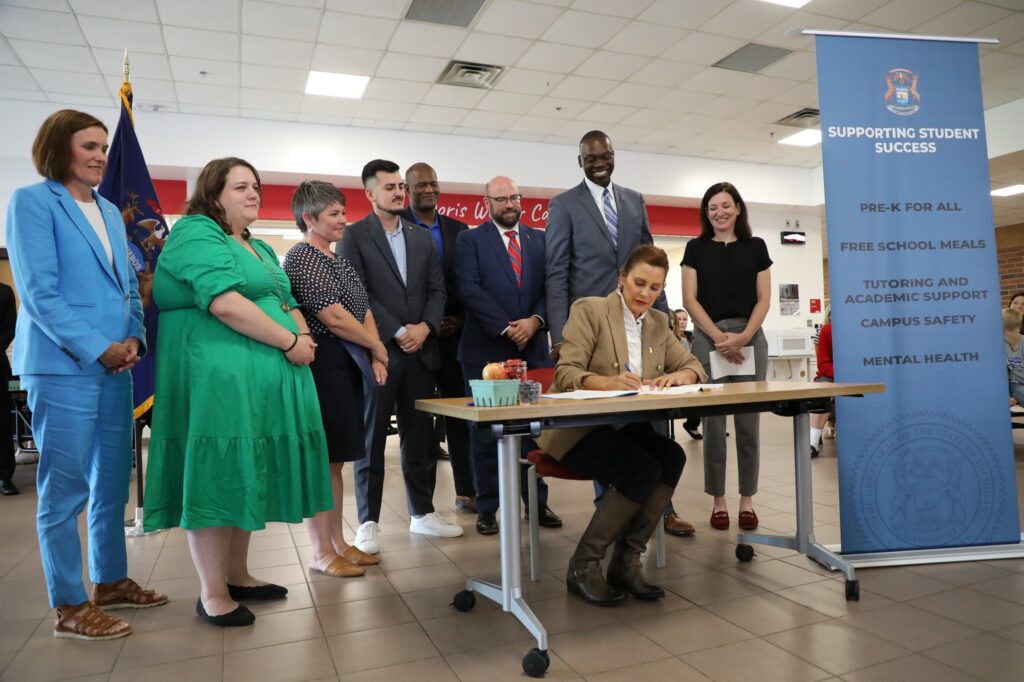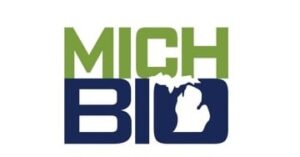
“This education budget will help our kids learn, grow, and thrive from pre-K through college or trade school and beyond,” said Governor Whitmer. “With record per-pupil funding of more than $10,000 for every child in every school, free breakfast and lunch for all to save parents almost $1,000 a year, per kid, free pre-K and free community college for all, and even more literacy support, we’re making sure every student has the tools and opportunities they need to succeed right here in Michigan without breaking the bank. We are supporting our hardworking educators with attraction and retention bonuses and free training programs to prepare even more skilled, qualified teachers for the classroom. Finally, we’re investing in our school, community college, and university campuses so they are even safer and better places for all our students.”
Click here to view the governor’s budget video.
“This education budget will make a difference for kids in communities across Michigan and set future generations up for success,” said Lt. Governor Garlin Gilchrist II. “It builds on our historic investments in students, educators, and schools with unprecedented per-pupil funding and free breakfast and lunch for all 1.4 million public school students. We will keep students safe thanks to record funding for school safety and mental health, while exposing them to career opportunities through before- and after-school programs, expanded career and technical education, and apprenticeships. Let’s keep Standing Tall so that every student knows they can afford to stay and succeed in Michigan.”
“I’m proud that we held the line and worked across the aisle to successfully deliver another historic education budget that puts the real needs of students front and center,” said Senate Majority Leader Winnie Brinks (D-Grand Rapids). “By securing the highest ever per-pupil funding, continuing the widely successful universal school meals program, and boosting literacy programs and at-risk funding, this bipartisan budget illustrates our unwavering commitment to Michigan students, educators, and schools.”
“Michigan’s new education budget puts parents and kids first, and it’s about time we had a state budget that did that,” said Speaker of the House Matt Hall. “Past budgets were stuffed full of earmarks and regulations, some of which even paid out to for-profit companies by taking money out of the classroom. That’s not right, and I’m glad we were able to come together to turn that around. This plan gives new flexibility to local districts, empowers parents to guide their children’s future, funds free breakfast and lunch, and increases funding for smaller classroom sizes. Together, we gave schools a major boost as the new year gets underway.”
“This education budget puts Michigan students first—whether they’re starting preschool, learning to read, preparing for college, or training for good-paying jobs,” said State Budget Director Jen Flood. “Governor Whitmer is protecting critical classroom funding, supporting our educators, and keeping college within reach for more Michigan families. Even in a year where tough decisions have been made elsewhere, education remains a priority—it is the foundation of long-term growth for Michigan.”
Legislator Quotes
“I am incredibly proud of the bipartisan school budget that’s being signed into law today,” said State Senate Darrin Camilleri (D-Trenton), Chair of the Senate Appropriations Subcommittee on K-12. “Senate Democrats worked hand in hand with Governor Whitmer to negotiate a budget that builds on our most successful programs – maintaining free breakfast and lunch for all students, increasing funding for at-risk schools investing in mental health and school safety grants, and raising our per pupil payment to a record high. We still have a lot of work to do, but this budget deserves credit for its sanity and clarity during this period in our country and the ongoing political chaos in Washington DC. I look forward to building on this progress in the coming years and making Michigan an event better place to raise a family and to go to school.”
“While Michigan continues to be generous in supporting public education, we are still awaiting much needed progress in student performance,” said state Representative Tim Kelly (R-Clinton), Chair of the House Appropriations Subcommittee on School Aid & the Department of Education. “That said, I am pleased to support a school aid budget with an historic increase in the foundation allowance, one that fully funds all public school students regardless of the school they choose to attend. Restoring health and safety, plus food support for every child, including non-public students, an increase for at-risk kids and installing important guardrails in how funds are used and spent.”
“This budget proves that when House Democrats stay at the table, we deliver results that make a real difference in people’s everyday lives,” said state Rep. Alabas Farhat (D-Dearborn). “We stepped up to increase per-pupil funding and ensured that kids can count on healthy meals at school. We protected at-risk funding for our most vulnerable students, maintained resources for English language learners, and prevented cuts to school mental health programs. This budget includes improvements to the classrooms where our kids learn and funding to keep our schools safe. Families can rest assured that here in Lansing we are making investments in their children so they can have successful futures.”
Stakeholder Quotes
“The Michigan Association of State Universities (MASU) commends Governor Whitmer and state lawmakers for coming together across party lines to champion higher education in Michigan,” said Daniel Hurley, CEO of MASU. “The budget invests directly in student success and strengthens the essential role our 15 public universities play in fueling innovation, driving economic growth, and preparing the workforce of tomorrow. It represents meaningful progress toward more stable, sustained funding for higher education and a stronger, more prosperous future for Michigan.”
“Michigan’s community and tribal colleges applaud this budget for sustaining critical student scholarships like the Community College Guarantee, part of the Michigan Achievement Scholarship, and Michigan Reconnect,” said Brandy Johnson, President, Michigan Community College Association. “These investments keep higher education within reach for recent high school graduates and adult learners alike, ensuring more residents can earn the skills and credentials needed to succeed in today’s workforce and strengthen Michigan’s economy.”
“This budget makes meaningful investments in Michigan’s students — from continued free meals to mental-health supports — and that’s worth celebrating,” said Tonya Whitehead, PhD, President, Michigan PTA. “As we move forward, we hope future budgets will arrive on time, with even greater transparency and family input. Public funds should continue to strengthen our public schools, where every child is welcome and every dollar makes a difference.”
“We are deeply grateful for the Governor’s continued commitment to Michigan’s young people, and for the bipartisan support we achieved through the FY26 budget process,” said Erin Skene-Pratt, Executive Director, Michigan After School Partnership (MASP). This investment in before- and afterschool programs, as well as summer learning opportunities, reflects a clear understanding that learning doesn’t end when the school day does. By supporting school-time and out-of-school-time programs together, our state is giving every child—no matter their ZIP code—the chance to learn, grow, and thrive.”
“As Michigan parents, we want to thank Gov. Whitmer and legislators from both parties for coming together and putting our children first,” said Jennifer Tuksal, a Rochester Hills parent and member of Michigan Parent Alliance for Safe Schools. “By putting aside their political differences, our elected leaders ensured that no child in Michigan starts the school day hungry and every child gets the nutrition and energy they need to learn, thrive and succeed in the classroom and beyond.”
Prioritizing Students and Educators
From preschool to postsecondary, the budget prioritizes students and educators with another historic per-pupil increase and dedicated funding for school meals.
K-12 Education
- $657 million to expand free pre-K to every 4-year-old in Michigan, regardless of family income.
- $593.5 million to support school operations through a 4.6% increase in base per-pupil funding—equating to an additional $442 per student, for a total of $10,050 per pupil.
- $321 million in total funding to support student mental health and school safety needs.
- $274 million to provide a 25% increase in funding to support academically at-risk students, English language learners, career and technical education students, and students in rural school districts.
- $248.1 million to continue providing free breakfast and lunch to Michigan’s 1.4 million public school students, helping students focus on learning and saving families nearly $1,000 per year.
- $203 million for an educator stipend program to recruit and retain teachers, putting money back in the pockets of educators.
- Up to $200 million in school infrastructure funding, to fix buildings and keep dollars in the classroom.
- $190.9 million to continue expanded support for special education services, a 9.4% increase in the state allocation from adjusted current law levels.
- $142 million for career and technical education operations, including $70 million to support the expansion and creation of programs in underserved areas.
- $125 million to continue support to districts for school transportation.
- $122 million for initiatives to directly support student literacy.
- $75 million to support students and parents through before and after school programming.
- $25 million to continue the Strong Beginnings preschool program for 3-year-olds.
- $10 million to fund Great Start Readiness Program startup grants.
- $6.1 million for partnership district support, providing oversight and assistance to schools and districts.
Higher Education & Workforce Development
- $1.8 billion in total for university operations, providing base support for Michigan’s 15 public universities to keep tuition affordable, maintain high-quality academic programs, and help students graduate and find good-paying, in-demand jobs.
- $380 million for the Michigan Achievement Scholarship, which provides a tuition free pathway for full-time community college students through the community college guarantee, and up to $27,500 for full-time students at public or private 4-year universities.
- More than 62,000 scholarships were awarded in the 2024-25 school year, and 120,000 students are expected to benefit once the program is fully implemented.
- A total of $375 million for community college operations, supporting Michigan’s 28 community colleges to deliver affordable associate degrees, transfer pathways, and skilled trades training across the state, helping more young people land good-paying jobs.
- $122.3 million for the Tuition Incentive Program (TIP), helping low-income students cover tuition costs at community colleges, public universities, and private colleges.
- $42 million for the Michigan Reconnect program, giving adult learners aged 25 and older a tuition-free pathway to earn an associate degree or skilled trades certificate.









